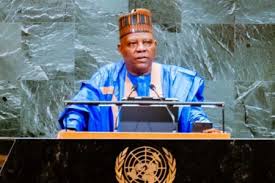Vice President Kashim Shettima, speaking on behalf of President Bola Ahmed Tinubu, has demanded that Nigeria be granted a permanent seat on the United Nations Security Council, insisting that global institutions must reflect today’s realities and not the world of 1945.
Shettima made the call on Wednesday while delivering Nigeria’s national statement at the 80th Session of the United Nations General Assembly in New York. The debate, themed “Better Together: 80 Years and More for Peace, Development, and Human Rights,” marks the UN’s eight-decade milestone.
He said Nigeria’s demand was not just about recognition but about fairness and credibility. “When the UN was founded, Nigeria was a colony of 20 million people. Today, we are a sovereign nation of over 236 million, projected to be the third most populous country in the world. We are a stabilising force in regional security and a consistent partner in global peacekeeping. Our case for a permanent seat at the Security Council is a demand for fairness and reform that restores credibility to multilateralism,” he declared.
The Vice President stressed that the UN must urgently reform if it is to remain relevant. He called for action in four priority areas: permanent Security Council representation for Nigeria, sovereign debt relief and improved access to global financing, fair benefits for resource-rich countries, and closing the digital divide.
On debt, Shettima urged the establishment of a binding mechanism, describing it as “an International Court of Justice for money,” to help developing economies manage sovereign debt burdens. According to him, excessive debt and dependence on primary commodity exports continue to strangle African economies, making growth and development difficult. He recalled the Lagos Action Plan of the 1980s as a framework that remains relevant in pushing for local value addition and industrialisation.
He further pressed for mineral-rich countries to receive fairer value from their resources. Using Nigeria’s Niger Delta as an example, he noted that stability increases when local communities benefit from natural wealth. “Africa has in abundance the minerals that will power future technologies. Investment in exploration, development, and processing of these minerals must create jobs and opportunities at home, not just abroad,” he said.
The Vice President also called for closing the global digital divide. He urged governments, researchers, and the private sector to work together to ensure that technological progress benefits emerging economies. “As our friend, the Secretary-General, has said: ‘A.I.’ must stand for ‘Africa Included.’ We must make technology a tool for inclusion, not division,” he added.
Turning to peace and security, Shettima highlighted Nigeria’s long-standing role in peacekeeping, noting that the country has participated in 51 of 60 UN peacekeeping operations since independence in 1960. He reaffirmed Nigeria’s commitment to multilateralism, stressing that peace could only be sustained through collective responsibility.
On global conflicts, he strongly supported a two-state solution to the Israeli-Palestinian crisis, condemning violence and calling for dignity, justice, and equal rights for Palestinians and Israelis alike. He said terrorists despise Nigeria because it chooses “tolerance over tyranny,” and warned that values, not military strength, are key to defeating extremism in the long run.
The Vice President also linked climate change to security and development, describing it as “an everyone issue.” He called for climate funds to be better used in education, resilient housing, and access to finance for vulnerable communities.
Shettima concluded by reaffirming Nigeria’s “full and unconditional” commitment to peace, development, human rights, and multilateralism. “None of us is safe until all of us are safe,” he said, urging the international community to take bold and practical steps to reform institutions for a fairer and more secure world.
